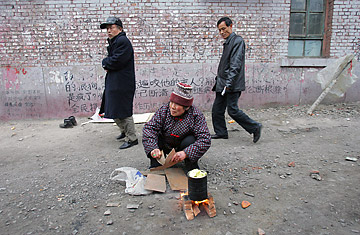
A Chinese petitioner cooks next to graffiti listing people's grievances outside of a supreme court petitions office in Beijing, China, March 1, 2007.
Also drawn to the annual meeting from all corners of China are representatives of those downtrodden and dispossessed in China's giddy rush to modernity. These are the Petitioners, representing millions of ordinary Chinese here to highlight some local injustice they have suffered — the illegal seizure of land or houses, or bullying by local authorities. They are exercising their millennia-old right to appeal for redress to those in power in the capital. Almost as old as China itself, this system has long served as a safety-valve, a court of last appeal for the desperate. Most of the main ministries run petitioning offices where supplicants can bring the thick bundles of papers documenting their cases that are the telltale sign of a petitioner.
Ground zero for petitioners is the area where the Beijing South train station once stood, which is the location of the main Petition Office run by the State Council, China's cabinet. The urine-scented alleyways and half demolished streets are filled with knots of grimy, exhausted petitioners, most clutching a bundle of documents as though their lives depended on them.
Because the chances of success are infinitesimally small — even the one in a thousand petitioners who succeeds in getting some sort of response from the authorities in Beijing usually finds that the resulting judgment is simply ignored back home in the provinces — petitioners often travel to the capital during the NPC meeting in the hope of winning support from a delegate. But the last thing that state security officials want to see is thousands of petitioners ruining their carefully choreographed event. Having in many cases endured beating and imprisonment by provincial security officials, the thousands congregating in the area around the South Beijing Station spend weeks moving from place to place as police raid their tents and makeshift homes, hoping to send them home.
Despite the risks and the poor chances of success, hundreds of petitioners still flock to the State Council Office each day. Among them, a few days ago, were four middle-aged peasant women from nearby Hebei Province. They have brought their petition to Beijing once a month or more for a decade says Yang Shuxia, a thickset 59-year-old bundled in four layers of clothing against the bitter winter cold. She and her companions seek a fair trial for their jailed relatives. In 1994, Yang explains, her son and three of his friends were arrested by police and charged with the murder of two taxi drivers. After confessing to the crimes, they were swiftly convicted and sentenced to death by a local court in their hometown of Chengde. But Yang's lawyer, Xu Zhiyong, says the confessions were extracted under torture. Xu says this case is one of the most glaring examples of injustice in China, with numerous flaws in the prosecution (the only two pieces of evidence were mysteriously lost) and eyewitness accounts corroborating the men's allegations that their confessions were beaten out of them. The thinness of the case has been acknowledged several times by higher courts, including the Supreme Court in Beijing, which ordered the court in Chengde to address numerous inconsistencies. And yet all four men are still in prison, two of them still facing suspended death sentences.
Back in February, Yang and the other families received a visit from local government officials in their hometown. "We come to the NPC every year and every year we are detained and taken back. But this year was different," she says. "The policemen told us we may get three or five years in prison." Yang is well aware the chances of success are minimal and the danger of imprisonment or worse is serious. But like thousands of fellow petitioners, she says she has no choice. "Of course we still come. Our children are innocent. How could we not come?"
